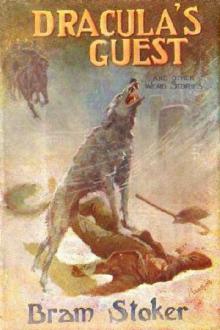The Chain of Destiny by Bram Stoker (non fiction books to read .txt) 📕

- Author: Bram Stoker
- Performer: -
Book online «The Chain of Destiny by Bram Stoker (non fiction books to read .txt) 📕». Author Bram Stoker
does she come from?”
“Her father is a clergyman in Norfolk, but he belongs to the
Warwickshire family. I met her at Winthrop, Sir Harry Blount’s
place, a few months ago, and took a great liking for her, which
she returned, and so we became fast friends. I made her promise
to pay me a visit this summer, so she and her sister are coming
here on Thursday to stay for some time.”
“And, may I be bold enough to inquire what she is like?”
“You may inquire if you like, Frank; but you won’t get an
answer. I shall not try to describe her. You must wait and
judge for yourself.”
“Wait,” said I, “three whole days? How can I do that? Do,
tell me.”
She remained firm to her determination. I tried several times
in the course of the evening to find out something more about Miss
Fothering, for my curiosity was roused; but all the answer I could
get on the subject was—“Wait, Frank; wait, and judge for yourself.”
When I was bidding her good night, Mrs. Trevor said to me—
“By-the-bye, Frank, you will have to give up the room which you
will sleep in to-night, after to-morrow. I will have such a full
house that I cannot let you have a doubled-bedded room all to
yourself; so I will give that room to the Miss Fotherings, and move
you up to the second floor. I just want you to see the room, as it
has a romantic look about it, and has all the old furniture that
was in it when we came here. There are several pictures in it worth
looking at.”
My bedroom was a large chamber—immense for a bedroom—with two
windows opening level with the floor, like those of the parlours
and drawingrooms. The furniture was old-fashioned, but not old
enough to be curious, and on the walls hung many pictures—portraits—
the house was full of portraits—and landscapes. I just glanced at
these, intending to examine them in the morning, and went to bed.
There was a fire in the room, and I lay awake for some time looking
dreamily at the shadows of the furniture flitting over the walls
and ceiling as the flames of the wood fire leaped and fell, and the
red embers dropped whitening on the hearth. I tried to give the rein
to my thoughts, but they kept constantly to the one subject—the
mysterious Miss Fothering, with whom I was to fall in love. I was
sure that I had heard her name somewhere, and I had at times lazy
recollections of a child’s face. At such times I would start awake
from my growing drowsiness, but before I could collect my scattered
thoughts the idea had eluded me. I could remember neither when nor
where I had heard the name, nor could I recall even the expression
of the child’s face. It must have been long, long ago, when I was
young. When I was young my mother was alive. My mother—mother—
mother. I found myself half awakening, and repeating the word over
and over again. At last I fell asleep.
I thought that I awoke suddenly to that peculiar feeling which
we sometimes have on starting from sleep, as if some one had been
speaking in the room, and the voice is still echoing through it.
All was quite silent, and the fire had gone out. I looked out of
the window that lay straight opposite the foot of the bed, and
observed a light outside, which gradually grew brighter till the
room was almost as light as by day. The window looked like a
picture in the framework formed by the cornice over the foot of
the bed, and the massive pillars shrouded in curtains which
supported it.
With the new accession of light I looked round the room, but
nothing was changed. All was as before, except that some of the
objects of furniture and ornament were shown in stronger relief
than hitherto. Amongst these, those most in relief were the other
bed, which was placed across the room, and an old picture that hung
on the wall at its foot. As the bed was merely the counterpart of
the one in which I lay, my attention became fixed on the picture.
I observed it closely and with great interest. It seemed old, and
was the portrait of a young girl, whose face, though kindly and
merry, bore signs of thought and a capacity for deep feeling—almost
for passion. At some moments, as I looked at it, it called up before
my mind a vision of Shakespeare’s Beatrice, and once I thought of
Beatrice Cenci. But this was probably caused by the association of
ideas suggested by the similarity of names.
The light in the room continued to grow even brighter, so I
looked again out of the window to seek its source, and saw there
a lovely sight. It seemed as if there were grouped without the
window three lovely children, who seemed to float in mid-air.
The light seemed to spring from a point far behind them, and by
their side was something dark and shadowy, which served to set
off their radiance.
The children seemed to be smiling in upon something in the
room, and, following their glances, I saw that their eyes rested
upon the other bed. There, strange to say, the head which I had
lately seen in the picture rested upon the pillow. I looked at
the wall, but the frame was empty, the picture was gone. Then I
looked at the bed again, and saw the young girl asleep, with the
expression of her face constantly changing, as though she were
dreaming.
As I was observing her, a sudden look of terror spread over her
face, and she sat up like a sleep-walker, with her eyes wide open,
staring out of the window.
Again turning to the window, my gaze became fixed, for a great
and weird change had taken place. The figures were still there,
but their features and expressions had become woefully different.
Instead of the happy innocent look of childhood was one of
malignity. With the change the children had grown old, and now
three hags, decrepit and deformed, like typical witches, were
before me.
But a thousand times worse than this transformation was the
change in the dark mass that was near them. From a cloud, misty
and undefined, it became a sort of shadow with a form. This
gradually, as I looked, grew darker and fuller, till at length
it made me shudder. There stood before me the phantom of the
Fiend.
There was a long period of dead silence, in which I could hear
the beating of my heart; but at length the phantom spoke to the
others. His words seemed to issue from his lips mechanically, and
without expression—“To-morrow, and to-morrow, and to-morrow. The
fairest and the best.” He looked so awful that the question arose
in my mind—“Would I dare to face him without the window—would any
one dare to go amongst those fiends?” A harsh, strident, diabolical
laugh from without seemed to answer my unasked question in the
negative.
But as well as the laugh I heard another sound—the tones of
a sweet sad voice in despair coming across the room.
“Oh, alone, alone! is there no human thing near me? No hope—no
hope. I shall go mad—or die.”
The last words were spoken with a gasp.
I tried to jump out of bed, but could not stir, my limbs were
bound in sleep. The young girl’s head fell suddenly back upon
the pillow, and the limp-hanging jaw and wide-open, purposeless
mouth spoke but too plainly of what had happened.
Again I heard from without the fierce, diabolical laughter,
which swelled louder and louder, till at last it grew so strong
that in very horror I shook aside my sleep and sat up in bed.
listened and heard a knocking at the door, but in another moment
I became more awake, and knew that the sound came from the hall.
It was, no doubt, Mr. Trevor returning from his party.
The hall-door was opened and shut, and then came a subdued
sound of tramping and voices, but this soon died away, and there
was silence throughout the house.
I lay awake for long thinking, and looking across the room at
the picture and at the empty bed; for the moon now shone brightly,
and the night was rendered still brighter by occasional flashes
of summer lightning. At times the silence was broken by an owl
screeching outside.
As I lay awake, pondering, I was very much troubled by what I
had seen; but at length, putting several things together, I came
to the conclusion that I had had a dream of a kind that might have
been expected. The lightning, the knocking at the hall-door, the
screeching of the owl, the empty bed, and the face in the picture,
when grouped together, supplied materials for the main facts of
the vision. The rest was, of course, the offspring of pure fancy,
and the natural consequence of the component elements mentioned
acting with each other in the mind.
I got up and looked out of the window, but saw nothing but
the broad belt of moonlight glittering on the bosom of the lake,
which extended miles and miles away, till its farther shore was
lost in the night haze, and the green sward, dotted with shrubs
and tall grasses, which lay between the lake and the house.
The vision had utterly faded. However, the dream—for so, I
suppose, I should call it—was very powerful, and I slept no more
till the sunlight was streaming broadly in at the window, and
then I fell into a doze.
II. More Links
Late in the morning I was awakened by Parks, Mr. Trevor’s man, who
always used to attend on me when I visited my friends. He brought
me hot water and the local news; and, chatting with him, I forgot
for a time my alarm of the night.
Parks was staid and elderly, and a type of a class now rapidly
disappearing—the class of old family servants who are as proud of
their hereditary loyalty to their masters, as those masters are of
name and rank. Like all old servants he had a great loving for all
sorts of traditions. He believed them, and feared them, and had
the most profound reverence for anything which had a story.
I asked him if he knew anything of the legendary history of
Scarp. He answered with an air of doubt and hesitation, as of one
carefully delivering an opinion which was still incomplete.
“Well, you see, Master Frank, that Scarp is so old that it must
have any number of legends; but it is so long since it was inhabited
that no one in the village remembers them. The place seems to have
become in a kind of way forgotten, and died out of people’s thoughts,
and so I am very much afraid, sir, that all the genuine history is
lost.”
“What do you mean by the genuine history?” I inquired.
“Well, sir, I mean the true tradition, and not the inventions
of the village folk. I heard the sexton tell some stories, but I
am quite sure that they were not true, for I could see, Master
Frank, that he did not believe them himself, but was only trying
to frighten us.”
“And could you not hear of any story that appeared to you to
be true?”
“No, sir, and I tried very hard. You see, Master Frank, that
there is a sort of club held every week





Comments (0)